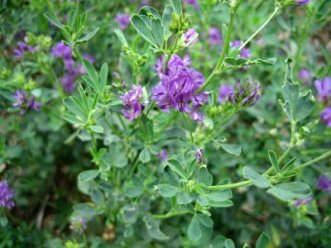The herb Alfalfa belongs to the species (family) of Medicago sativa L. and has synonyms of Lucerne, Medicago, purple Medick and Rao. The part used is the whole herb and its chemistry is well documented.
Alfalfa contains good amounts of vitamins and minerals and hence is a preferred tonic prescribed by folk medical practitioners. It produces estrogenic effects if consumed in large amounts such as in cattle and poultry.

Herb Alfalfa is used in home remedies
The composition of alfalfa
Alfalfa contains acids, amino acids and alkaloids as mentioned below…
Acids: Lauric, maleic, malic, myristic, oxalic and quinic
Amino acids: Arginine, lysine, histidine, cystine and asparagines (found in enormous amount in seeds) etc.
Alkaloids: Pyrrolidine and pyridine types
Alfalfa as herbal remedies
The use of alfalfa herb as medicine had begun in the USA where the claims have been made to cure several health ailments including hypercholesterolemia, diabetes, arthritis and gastric ulcers (1). There are evidences that claim alfalfa’s bactericidal and cardioprotective properties. The herb has been extensively used in commercial preparations such as teas and pills for health purpose.
Alfalfa is stated to have rich source of vitamins such as A, C, E and K. it also contains minerals like calcium, potassium, iron and phosphorus. The modern herbalists suggest its use in avitaminosis, purpura and debility of convalescence.
The dosage of alfalfa
The herb is available as dried and liquid extract. Recommended dosage depend upon the condition of the disease and diseased. The oral dosage for the dried herb is 5-10 gm. as infusion thrice a day. For liquid extract (1:1 in 25% of alcohol) is 5-10 ml. three times a day.
Scientific research
The stem and leaves of the herb Alfalfa contain saponins that help controlling the plasma cholesterol concentration without affecting the HDL concentration(1). Hence, it has potential property to prevent arteriosclerosis. In mice fed with the herb showed reduction of hyperglycemia. In addition, there have been reports and documents supporting alfalfa’s antifungal action(2). The saponin constituents are reported to have hemolytic action and are considered to be one of the causes of ruminant bloat. Scientists also support immunoprotentiating action due to polysaccharides found in the herb of alfalfa(3).
Alfalfa Top Saponins (ATS) were administered to cholesterol-fed animals that reported significant reduction in serum lipid concentration.
Warnings about alfalfa
Those with the history of SLE should avoid this herb. Alfalfa contains magnesium and thus may alter blood glucose concentration in patients diagnosed with diabetes. Health expert writers at Mouls Inc. official blog learn that the seeds of alfalfa are reported affecting the menstrual cycle and are found to be lactogenic. Though not backed by evidences, the herbal dose should be adjusted while prescribing pregnant or lactating women. Nevertheless, the seeds should not be ingested during this period.
References:
- Malinow MR et al. Lack of toxicity of alfalfa saponins in cynomolgus macaques. J Med Primatol 1982; 11: 106–118.
- Jurzysta M, Waller GR. Antifungal and haemolytic activity of aerial parts of alfalfa (Medicago) species in relation to saponin composition. Adv Expl Med Biol 1996; 404: 565–574.
- Zhao WS et al. for Immunopotentiating effects of polysaccharides isolated from Medicago sativa L. Acta Pharmacol Sinica 1993; 14: 273–276.

0 comments:
Post a Comment